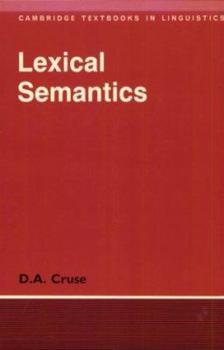Lexical Semantics
Lexical Semantics is about the meaning of words. Although obviously a central concern of linguistics, the semantic behaviour of words has been unduly neglected in the current literature, which has tended to emphasize sentential semantics and its relation to formal systems of logic. In this textbook D. A. Cruse establishes in a principled and disciplined way the descriptive and generalizable facts about lexical relations that any formal theory of semantics will have to encompass. Among the topics covered in depth are idiomaticity, lexical ambiguity, synonymy, hierarchical relations such as hyponymy and meronymy, and various types of oppositeness. Syntagmatic relations are also treated in some detail. The discussions are richly illustrated by examples drawn almost entirely from English. Although a familiarity with traditional grammar is assumed, readers with no technical linguistic background will find the exposition always accessible. All readers with an interest in semantics will find in this original text not only essential background but a stimulating new perspective on the field.
Format:Paperback
Language:English
ISBN:0521276438
ISBN13:9780521276436
Release Date:September 1986
Publisher:Cambridge University Press
Length:328 Pages
Weight:1.12 lbs.
Dimensions:0.8" x 6.0" x 8.9"
Customer Reviews
1 rating
An elegant exposition of how semantics is done
Published by Thriftbooks.com User , 20 years ago
A mature science, like Physics, has a panoply of formalisms, apparati, and methods for making epistemic progress. But in a newer science, like semantics, how do you even get off the ground? Cruse here provides a marvelous exposition of the methods employed by semanticists, and some results obtainable from them. His intellectual honesty is such that he never claims more for them than what is warrented--he never tried to make too much stew from one oyster. There are vast areas of semantics and linguistics which just can't be formalized. But Cruse here shows us how at least to get started. The approach he describes is one he calls a "contextual" approach--"the semantic properties of a lexical item are fully reflected in appropriate aspects of the relations it contracts with actual and potential contexts". Astute readers will note the perhaps surprising agreement here between Cruse and Quinian Holism. To get a grip on the meaning of a word, the best way is to systematically examing sentences which contain that word, and see if the sentences seem intuitively "wrong" somehow or "right". For example, it tells us something about the meaning of the word "light" that the sentnece "It was too light for me to lift" seems wrong somehow. Certain readers might at first consider this intuition-based method to be hopelessly unscientific, but as Cruse points out, every measurement, at some point, depends upon human judgements--e.g. when measuring temperature, you have to judge which line on the thermometer is closest to the mercury. Indeed, that is what a measuring device does--makes quantities easier to make judment calls about. A great insight. Cruse developes analogous "measuring instruments" to help with investigating what words mean. Again, Cruse's intellectual honest is such that he never presses these too far, and he always fully respects the limits of these tools. Using these tools, Cruse then goes on to examine several ways in which words can be related to each other. These are: Taxonomical relations -- if fido is a dog, then he _is_ an animal, he _might_ be a poodle, but is _not_ a cat. Meronomies -- a finger is part of a hand, but not a subset of a hand. opposites -- if something is hot, it is not cold and many others. Always clearly written, always clear about the limitations, this book should be on the shelf of every semanticist. This book could also be profitably read as a case study in an advanced course on philosophy of science, showing how to extract scientifically useful information from an as-yet-unformalizable body of knowledge. Highly recommended.





